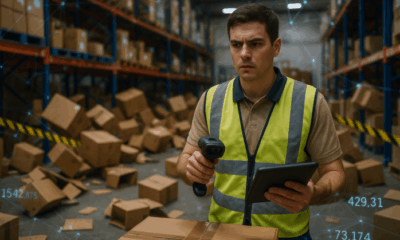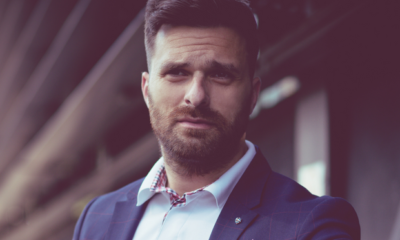Success Advice
7 Steps to Becoming an Accountability Rockstar

An accountability partnership equates to responsibility. This includes responsibility to your partner and to yourself. The accountability partnership involves keeping your promises. It is a willingness to lengthen your stride. It is an opportunity to propel yourself and your accountability partner to new heights of goal achievement.
The benefit of having an accountability partner is understanding expectations. You also have similar examples to look to. You can check in with each other on a regular basis about what is happening with your goals. You can also discuss how you feel about the situation and the progress. If you are unsure of how to solve a certain situation, you can gain valuable feedback.
The drawbacks of having an accountability partner are more logistical than relational. You may not be there in person for a natural conversation. Communication delays may prevent you from gaining needed advice for an important decision.
Yet the benefits far outweigh the inconveniences. You both want to become your future selves. You want to become your best selves. You want to manage your time and talents. You enjoy giving and receiving feedback. You rejoice in each other’s successes, and inspire each other when you struggle.
The Ultimate Partnership
My own accountability experiences began when I became a health coach helping clients with accountability for their various health goals. Soon, I realized that I also needed an accountability partner. It wasn’t enough that I was helping someone else with accountability. I needed to also be on the receiving end of that partnership. I needed to experience it for myself. For reciprocity and experience, I sought out an accountability partner.
Here’s how to rock it as an accountability partner:
1. Find an Accountability Partner
Find a partner. That person may be a family member, friend, work colleague, coach, etc.
I actually have two accountability partners. My first was my husband. There are many benefits of having a family member as an accountability partner. One benefit is the in-person contact you experience each day. I love the opportunity to have a more natural conversation (instead of text or email).
My husband and I discuss my experiences with business and personal goals. We focus on what I’m doing well and what areas I can improve upon. I also gain valuable feedback from him as I work toward my goals.
For example, we talk through various questions:
- Do I appear stressed out about my goals, or am I calm and focused?
- Do I understand the WHY behind my goals?
- Am I going about my goals in a methodical, logical way?
My second accountability partner has been a close friend of mine for many years. She has several children and grandchildren, and is now involved in a family business. Her focus is on her family and being able to give back to those who have served her over the years. She joined an accelerated momentum program a few years before I did, so the timing was perfect. We are able to share our perspectives and experiences as we go through the program together.
“Accountability is a statement of personal promise, both to yourself and to the people around you, to deliver specific defined results.” – Brian Dive
2. Create A Schedule and Commit to It
Determine the best contact method (in person, video, text, email, etc.). Determine your contact schedule. How often will you meet? For what duration of time? Be mindful of schedule changes, vacations, or other conflicts. You may choose to halt reporting to your accountability partner during these times. Add the accountability reporting to your calendar. Treat it like you would any other priority task, because it IS that important.
I report to both of my accountability partners every morning and evening. This creates a bridge between what I intend to do that day and what I actually accomplished. Reporting twice a day helps me to be more focused throughout the day.
3. Develop Hard and Soft Skills
Accountability partnerships are perfect opportunities to let progress blossom in your chosen profession. Your profession may include hard skills (medicine, computer science, engineering, etc. ), and soft skills (listening, leadership, communication, time management, etc.). I have also learned the importance of being present in the conversation. I make time and focus on the relationship and how I can help my own accountability partners do their best.
4. Ask the Tough Questions
Ask questions. Be an active and engaged accountability partner. Be interested in what your partner is doing and their thoughts on the process. Show sincere interest. During our accountability reporting, my husband brings up a variety of different ideas. He asks questions that get me thinking about my goals in more detail. Having that added perspective keeps your mind open to learning and growing.
5. Celebrate victories
My accountability partners show enthusiasm, excitement, and emotion when I fulfil my goals. I, in turn, await the results of their daily goals so I can celebrate with them.
6. Offer a Listening Ear for Defeats
Defeat is part of the learning process. Defeat helps you become more resilient. My friend gives a lot of encouragement when I’m hard on myself and I don’t achieve my goals on a particular day. She focuses on the positive and helps me to learn from that experience so that I can teach others.
“Accountability is the glue that ties commitment to the result.” – Bob Proctor
7. Desire Success
An accountability partnership is a symbiotic relationship. You learn from and nourish each other. The desire for success must be present for the partnership to work. Success should be your number one outcome.
Accountability partnerships are learning experiences where you can serve each other. From my own accountability partners, I have learned to be more compassionate. I have resolved to be more service oriented. I have understood how to make time for skill development.
An accountability partnership is about building relationships and fostering understandings. It is about developing communication skills and rendering service.
You can become an accountability rockstar!
Did You Know
How Skilled Migrants Are Building Successful Careers After Moving Countries
Behind every successful skilled migrant career is a mix of resilience, strategy, and navigating systems built for locals.

Moving to a new country for work is exciting, but it can also be unnerving. Skilled migrants leave behind familiar systems, networks, and support to pursue better job opportunities and a better future for their families. (more…)
Life
10 Research-Backed Steps to Create Real Change This New Year
This New Year could finally be the one where you break old patterns and create real, lasting change.

Every New Year, we make plans and set goals, but often repeat old patterns. (more…)
Change Your Mindset
The Silent Skill That Makes People Respect You Instantly
What truly earns respect and why most people go about it the wrong way

Everybody craves respect but not everyone earns it. Some people believe that a title, years of experience, or a position of authority automatically entitles them to respect. (more…)
Entrepreneurs
The Essential Skills Every Entrepreneur Needs In 2026
Success in the digital age isn’t about luck. It’s about mastering the skills that separate dreamers from doers.

When I was 22 years old, I started my first side hustle as a ghostwriter. (more…)
-

 Business4 weeks ago
Business4 weeks agoWhy Your E-Commerce Fulfilment Is Probably Broken (And How to Fix It)
-

 Shift Your Mindset4 weeks ago
Shift Your Mindset4 weeks ago11 E’s That Define Every Great Leader And Why Most People Miss Them
-

 Did You Know3 weeks ago
Did You Know3 weeks agoThe Success Patterns You Inherited (And Didn’t Notice)
-

 Entrepreneurs3 weeks ago
Entrepreneurs3 weeks agoThe Essential Skills Every Entrepreneur Needs In 2026
-

 Business3 weeks ago
Business3 weeks agoThe Hidden Money Pit in Your Operations (and How to Use It)
-

 Change Your Mindset2 weeks ago
Change Your Mindset2 weeks agoHow to Turn Your Mind Into Your Greatest Asset (Instead of Your Enemy)
-

 Change Your Mindset2 weeks ago
Change Your Mindset2 weeks agoThe Silent Skill That Makes People Respect You Instantly
-

 Life1 week ago
Life1 week ago10 Research-Backed Steps to Create Real Change This New Year



























1 Comment